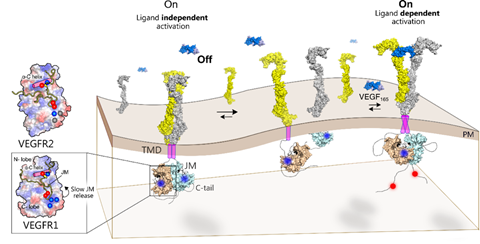The activation process of a cell surface enzyme known as VEGFR1 can show the way towards developing medical solutions for colon and renal cancers
Scientists at the Indian Institute of Science Education and Research (IISER), Kolkata have discovered the mode of activation of a cell surface protein – an enzyme – na finding that might hold the key to the development of treatment for renal and colon cancers. They have reported their findings in Nature Communications.
Vascular endothelial growth factor receptors (VEGFR) are a group of proteins that are present on the cell surface which bind to external agents – eg hormones – in order to mediate cellular mechanisms such as cell differentiation, proliferation, survival, metabolism, and migration. These are also believed to have a role in the etiology of some cancers.
In a statement on the findings, the ministry of science and technology have said: “Researchers have decoded the molecular mechanism in which a cell surface receptor belonging to the family of enzymes that bind growth factors, regulate cell differentiation, proliferation, survival, metabolism, and migration, prevents cancers.
This enzyme called VEGFR1 withholds self-expression (autoinhibited) in the absence of a ligand—for example hormones. The research can show the way for developing medical solutions for colon and renal cancers by using molecules that preferentially stabilises the inactive state of VEGFR1.”
The activation pathway highlighted by the researchers led by Dr Rahul Das of IISER involves the binding of the protein to an external agent triggering a set of mechanisms that cause the addition of a phosphate to receptor that causes processes that are normally kept in check to be set in motion. The ministry’s statements says: “Spontaneous activation of RTKs (cell surface receptors), in the absence of ligands, is often linked to multiple human pathologies like cancers, diabetes, and autoimmune disorders. Researchers are exploring how a cell maintains an autoinhibited state of the enzyme and why such autoinhibition is breached during the progression of human pathology.”


